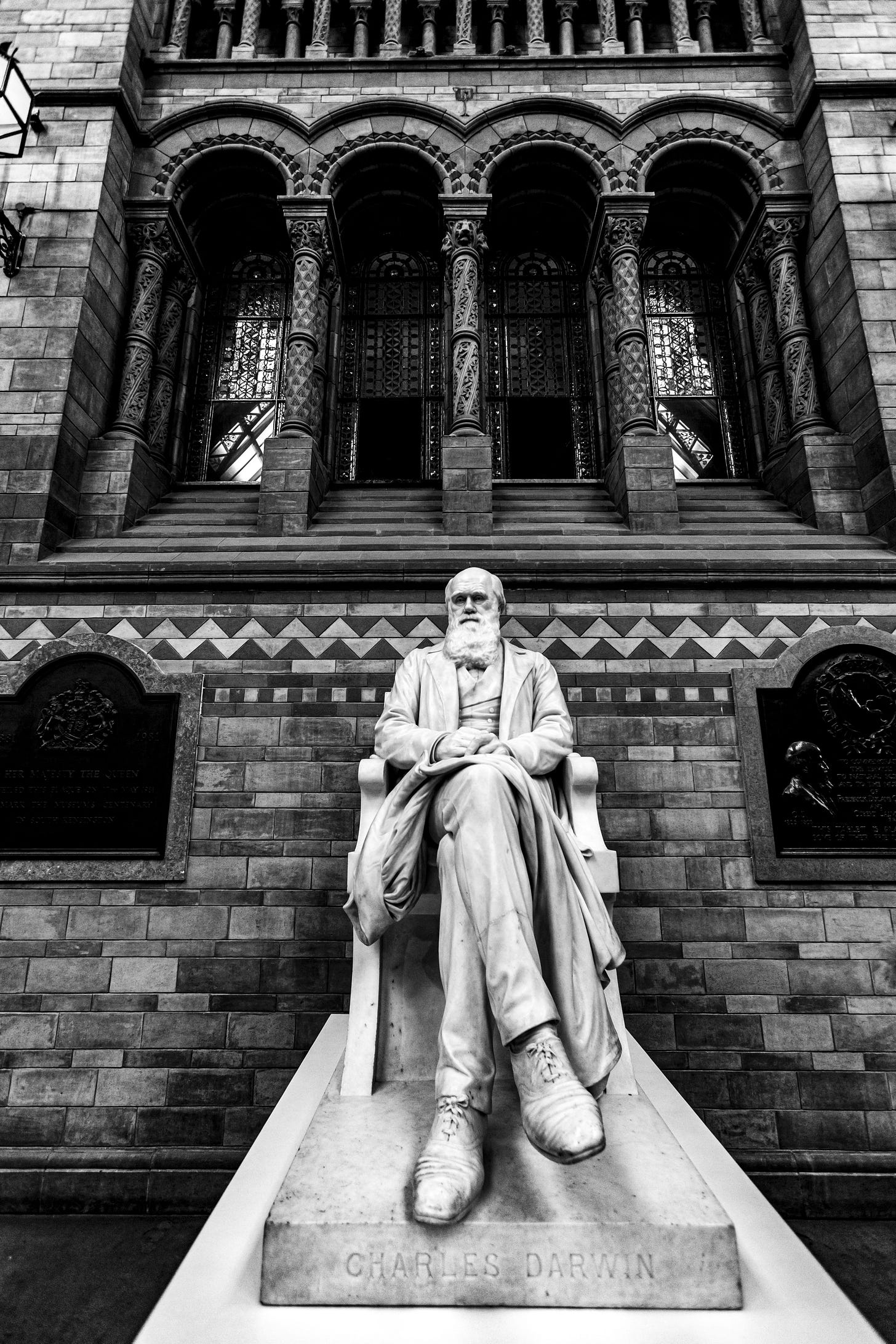Everything Evolves
There are two options in this universe – evolution or extinction. Which will we choose?
“It is not the strongest of the species that survives, nor the most intelligent that survives. It is the one that is most adaptable to change.”
This is a widely circulated quote which is misattributed to Charles Darwin. It may not belong to Darwin, but it’s certainly a good summary of his theory of natural selection. Once revolutionary, the principles elaborated upon in On the Origin of Species are now the cornerstone of our understanding of biology.
But the concept of evolution doesn’t just apply to the evolution of the natural world – it applies equally well to the development of our modern cities and sprawling infrastructure, our conflicting cultures, and the digital algorithm-driven world in which we spend increasing portions of our lives.
And that brings us a couple of key questions: Who am I? What’s the purpose of this blog? Why am I writing it? And why should you read it?
Let’s start with the last question, as that’s the one you probably care about the most.
Why should you read Everything Evolves?
This blog is about evolution, yes, but it’s about more than biological evolution.
It’s about the evolution of human civilisation, and all of the various complex and interconnected systems which comprise it.
This blog will explore the intersection between science and the humanities:
If your background is in the humanities and you want to understand the natural forces which have a direct impact on our society today – especially the evolution of the human mind – then this is the place for you.
If your background is in science, and you want to know why global politics has evolved into such a mess – and what we can do about it moving forwards – this is the place for you.
If you plan on being influential in any of the systems of modern society – politics, public services, businesses, cultural institutions – this is the place for you, too.
Everything in life is connected to everything else – but that’s not how it’s taught. Which brings me to the answers to those other questions.
Who am I? How did I evolve?
As a brief introduction: my name is Nicholas Moore, I’m 31 (at time of writing), and I’m a communications consultant with a background in science, a job which gives me insights into a wide range of sectors and industries – including national and local politics, the property sector, the energy transition, technology start-ups, and impact investing. I live in London, UK, with my partner and my sausage dog (the latter being my all-time favourite example of the power of selective breeding).

I grew up in an apolitical household in a sleepy town in rural Yorkshire, and I was immersed in natural science from a young age. You could often find me poring over books explaining the features of the solar system and imagining what it would be like to explore the moons of Jupiter, or recreating scenes from Walking with Dinosaurs with my extensive collection of plastic dinosaurs (only with more dinosaur fights). I was fascinated by the natural world, especially the majesty of space. As a consequence, my selection of academic studies tended to focus both on the very largest forces governing the universe – gravity, galaxies and stars – and the very smallest – electrons, atoms and molecular reactions.
On the flip side, I inherited from my parents a comparative lack of interest in how society was governed, how it had been shaped by events in the past, or how culture could be influenced by the arts and the media. I studied History at school not because I was interested in it, but because I thought it would help my CV look more well-rounded.
But, though I may have overlooked the value of the humanities, I was fascinated by the human mind – how is that a grey lump of spindly interconnected cells can produce the magnificently rich stream of consciousness that we all experience every day? I began studying psychology when I was 17 but dropped it for further maths – again, regrettably, because I considered this would look better on my CV when applying to university.
I studied Natural Sciences at Cambridge, an interdisciplinary degree which offers students to opportunity to study multiple complementary physical and biological science subjects. It was there that I learned, for the first time, about biological evolution – a course I picked up purely because it sounded interesting.
This was one of the defining experiences of my life.
It made the pieces of the puzzle click together in a way that they hadn’t before. For the first time, I was able to see and understand the chain of events stretching from the Big Bang, through the formation of the solar system and planet Earth, the genesis of life in its ancient oceans, and billions of generations of geological and biological evolution leading to the present moment – to you, reading this blog.
Even despite this, I chose to focus my degree on chemistry – not because I was interested in it, but because I was good at it, and I wanted a good grade. Once again, I had prioritised what I imagined would be in my best interest, rather than following my passions, and once again it was the wrong path to tread.
It wasn’t until much later, when I was in my late 20s, that I started to connect this understanding of the evolution of natural history with my own life, and the mundane everyday forces which govern our society – the politicians I saw on the news, the roadworks outside my house, the prices in my local pharmacy, the trending social media content on my phone. It took me longer than it perhaps should have done, but I finally started engaging with the humanities and the social sciences – learning about the development of human civilisation, of culture, social dynamics, economic systems and the law.
I realised that, ultimately, each of our lives is connected to everything else, and to everything that came before. But, until this point, in part due to the siloed way that we teach subject disciplines here in the UK (particularly before university), this had never been apparent to me. And the problem isn’t limited to our education system, but with our entire conception of science. Often, the way we conduct science is to focus on increasingly narrow subject matters, with limited cross-disciplinary communication.
As an example, the medical disciplines of psychiatry (the study of mental illnesses) and neurology (the study of illnesses of the nervous system) have only been collaborating to any great degree for a decade or so, largely to study neurodevelopmental disorders like autism and ADHD. This is in spite of the fact that both disciplines have ostensibly been studying from different angles the same thing – the human brain – for literally thousands of years.

The way we learn about everything may be disconnected, but, in reality, everything is connected to everything else. The forces that govern one domain influence others too. Genetics govern the development of an individual human, and also influence that individual person’s interactions with other humans within wider society.
Similarly, the present moment only exists in its current shape because it evolved from the past, built on everything that came before. The electric car couldn’t exist if we hadn’t first developed the motor car and the electric battery. It may seem trivial, but human society – our modern, globalised civilisation – evolved from the societies of the past. We didn’t just inherit the obvious technological developments, but also the more subtle (but no less pervasive) cultural and political developments.
If you want to truly understand any system, you must understand how it evolved.
And that brings me to perhaps the most important question.
What’s the purpose of Everything Evolves?
The purpose of this blog is to examine how all the systems which constitute human society have evolved and continue to evolve; to explore the interconnected nature of modern life; to find ways of predicting – and therefore influencing – the path of societal evolution to ensure that we as a species are developing in a direction that creates a better future (and, as a matter of personal preference, avoids a Dune-style future civilisation featuring space feudalism and empires based on resource monopolies).
Put simply, evolution is the process whereby a system undergoes development over time in response to selective pressures.
So, for biological evolution – the most well-known example – the system might be a population of monkeys. In this case, the selective pressures might be the changing environmental conditions – temperature, availability of food, presence of predators – which remove individuals less well adapted to the selective pressures of the environment from the gene pool before they are able to pass on their genes to the next generation. This is the core of Darwin’s theory of natural selection.
But, crucially, this concept applies much more broadly. In general terms, a selective pressure is any force which acts on a system that leads either to the system’s adaptation or to its diminishment. The system then responds to these selective pressures, causing it either to evolve over time, becoming better adapted to its environment, or to instead become extinct.
Evolution can occur across all time scales. At one end of the spectrum, systems of chemical reactions evolve very rapidly according to their initial conditions and the selective pressures acting on the system over time (things like temperature, pressure, and quantities of the compounds which affect the reaction). The well-studied example of how the release of massive amounts of refrigerants (chlorofluorocarbons, or CFCs) perturbed the stability of atmospheric ozone reactions serves as a nice example of how this can have a direct impact on our day-to-day lives.
And, at the other end of the scale, we have galaxies – systems which evolve on the timescale of stars, responding to the selective pressures of gravity, dark energy, and nuclear interactions – the fundamental forces of the universe.
In biological evolution, it is necessary for the system which is evolving – the population of a given species – to be able to reproduce in order to avoid extinction. But, in systems which do not rely on the imprecise reactions of chemicals like DNA, RNA, and proteins, reproduction is not necessary – the ability for self-adaptation works just as well. This applies not only to astronomical systems like the solar system and planets, but also to the evolution of human institutions, cultural practices, and artificial intelligence algorithms.
This will be the central theme running through Everything Evolves – but what can you expect in terms of actual content? What will I be writing about?
What can you expect from Everything Evolves?
I’ll largely be considering the following question: What selective pressures contribute to the evolution of human society?
As an overview:
Our economic system is a significant driver of the direction of evolution of our society, determining where we decide to invest our resources – and determining who gets to make those decisions – with considerable impact from macroeconomic and microeconomic trends.
The law is another key driver, regulating and enforcing the interactions between people and organisations within society.
The technology that we develop and use determines the limits of what it is possible to accomplish.
The hard infrastructure we build – cities, transport networks, communication networks – opens new possibilities for societal development, as does the soft infrastructure we choose to invest in – healthcare, education, public services.
The culture, language, ideas and values that we hold as a society, including philosophical positions and religious beliefs, strongly govern interactions between individuals and groups.
The organisational structures we build – how we form teams, companies, institutions, and nations – create frameworks for our interactions.
All of these things are either governed or greatly influenced by politics and our political systems, whether built deliberately from scratch, or evolved gradually over hundreds of years.
The competition between rival ideologies, institutions, companies, cultures, political systems, economic systems, and nations acts as a strong selective pressure, threatening extinction to those systems which are unable to spread or adapt.
Each of these interconnected systems evolved from previous iterations. If you really want to understand how these society-level systems are evolving into the future, it’s helpful to look at how they evolved in the past. To understand the evolution of trade, group dynamics, power, culture, philosophy, religion, communication, and technology.
And, perhaps most importantly of all, you need to understand the evolution of the human mind, as underlying all of this is human nature itself. Our emotions, biases, and instincts were carefully selected by biological evolution over millions of years to ensure our survival in small groups. These underlying psychological drives exert a dramatic influence on the emergent systems that direct the evolution of human civilisation, making it helpful to understand the evolution of language, behaviour, sociality, emotions, and even consciousness itself.
We can even dig deeper and investigate the forces that led to the evolution of consciousness – to think about the evolution of biological life and its ecosystems, to consider how the fundamental forces of the universe led to the emergence of all of these higher order systems and continue to dictate how they unfold today.
Okay, so, there’s a lot to cover! But I will always tie the topic I explore back to the central theme: the evolution of human civilisation.
I’ll be aiming to post once a month, to get started. I don’t expect all my posts to be as long or as broad as this first one – I’ll be examining some of these systems in isolation, and then thinking about how they fit into the bigger picture.
As Everything Evolves develops, I’m aiming to create subscriber-exclusive content, guest articles, Q&As, and insights into the writing process – if you’d like to be on the ground floor, influencing the evolution of this community, then please consider subscribing!
Why am I writing Everything Evolves?
So, why am I writing this blog?
I believe that it is possible to predict the broad evolutionary path of human civilisation by understanding the selective pressures which act upon it and its overlapping component systems. Possible, yes – but far from easy or straightforward, so I think there is real value in exploring these ideas.
I especially think there is value in exploring these issues right now, in the present moment, in an era where the effects of multiple paradigm-changing social and technological revolutions are unfolding concurrently – globalisation, social media, artificial intelligence, climate change.
I am hoping to build a community of readers who are also interested in these broad, interdisciplinary topics – I hope you will consider contributing your thoughts and perspectives in the comment section.
But, mostly, I am writing this blog because I am finally choosing to follow my interests, rather than spending my time based on what I think will look best on my CV.
I hope you will consider reading it for the same reason.
I started this post with a quote misattributed to Charles Darwin; I’ll end it with something he actually wrote, reflecting on the slavery he witnessed in Brazil and how it compared with the starkly class-divided society of Victorian England:
“If the misery of our poor be caused not by the laws of nature, but by our institutions, great is our sin”.






Enjoyed reading - is very much in your voice. Will look forward to the next post.
What a brilliant read. I can't wait for more, particularly the intersection with mental health.